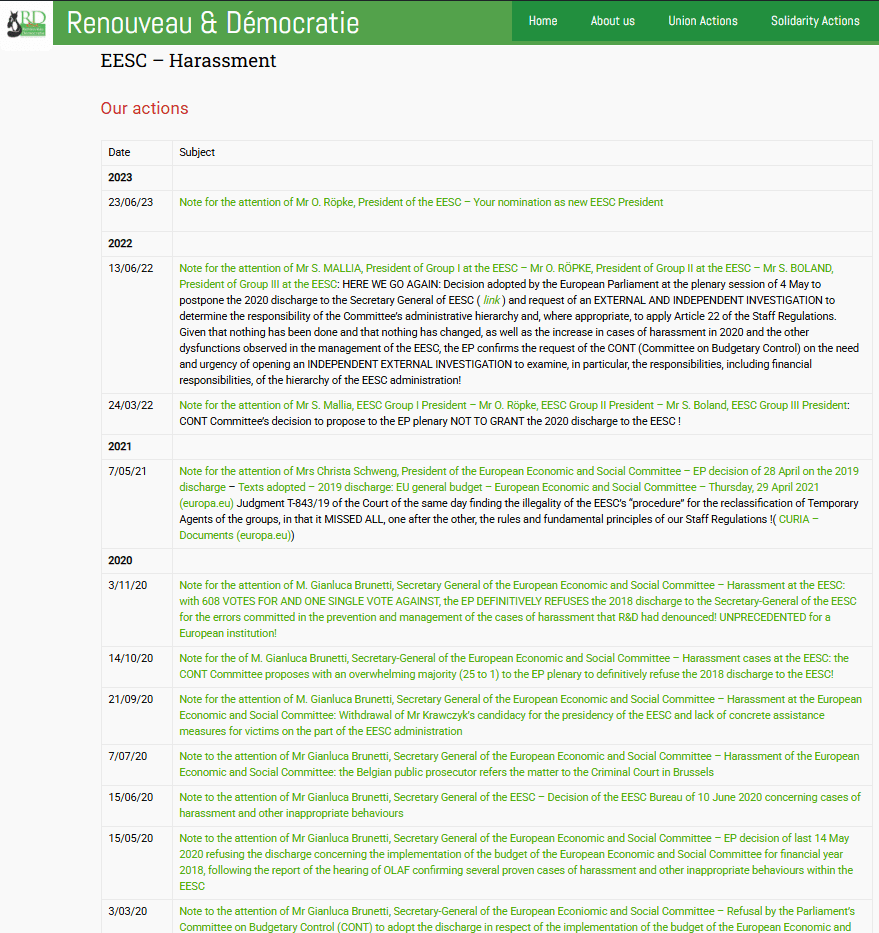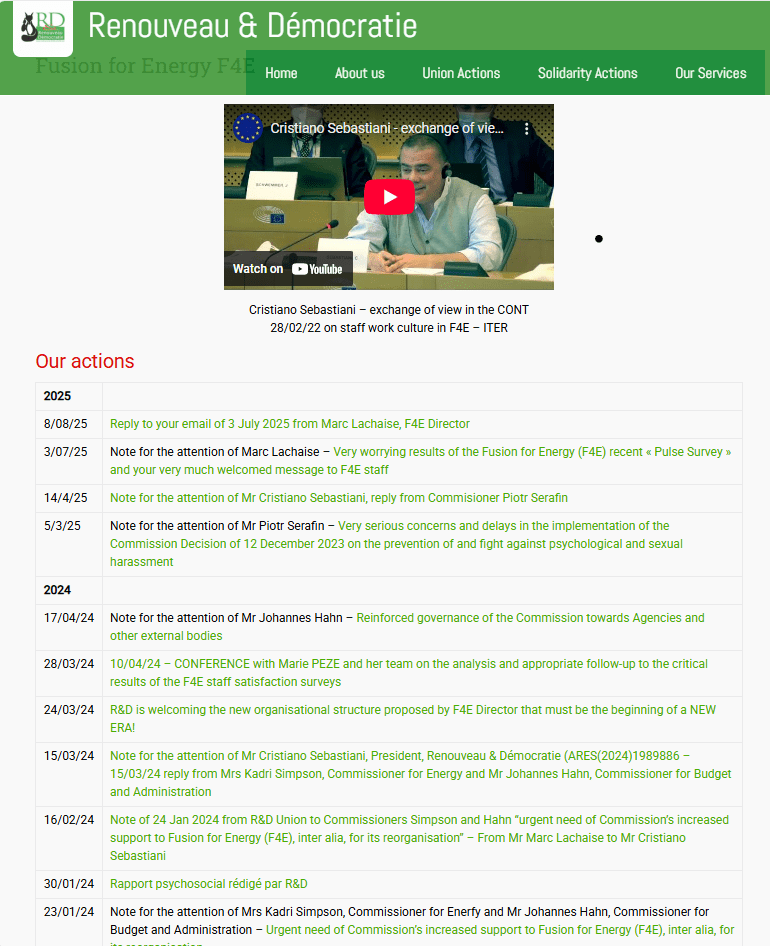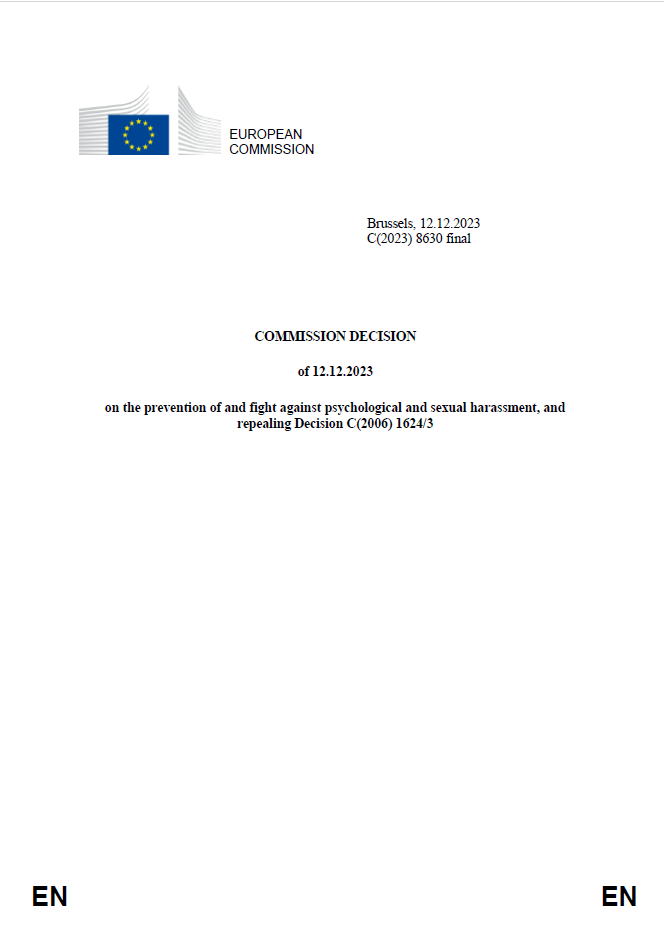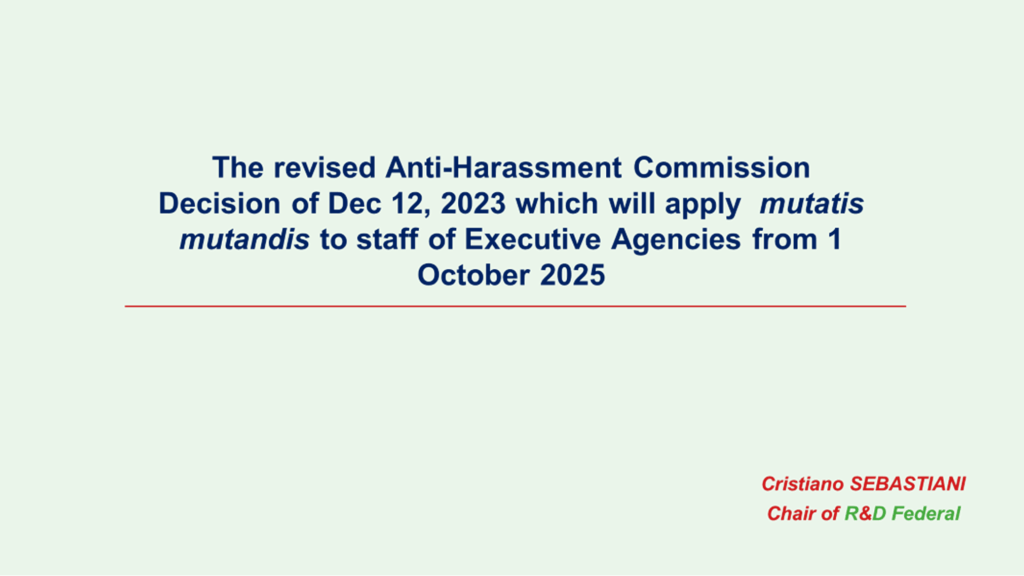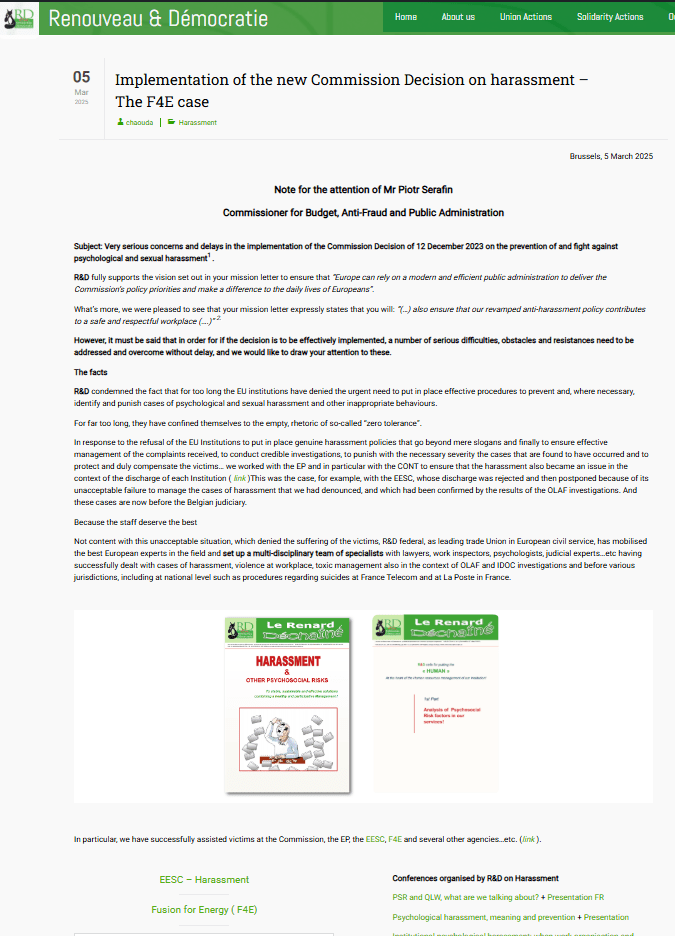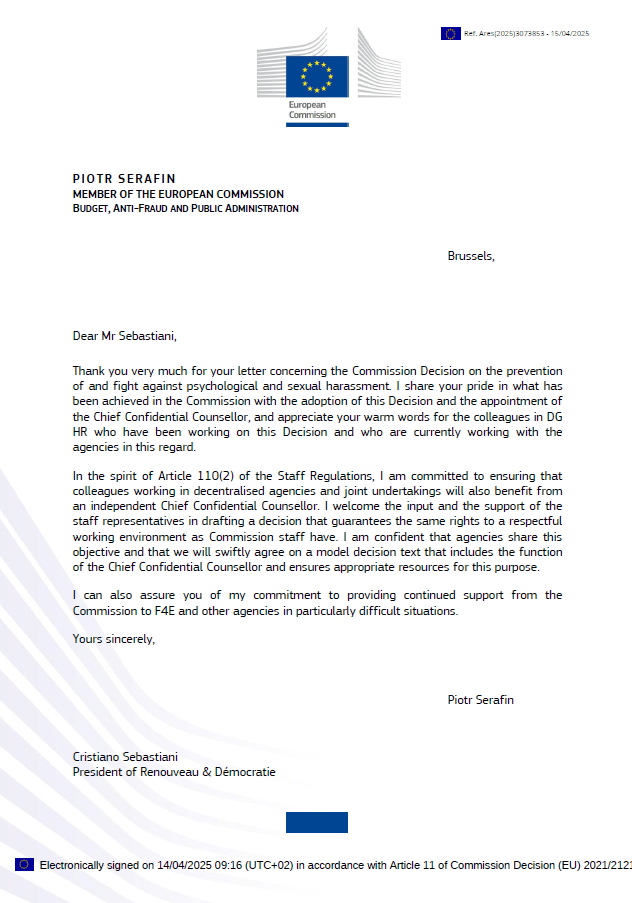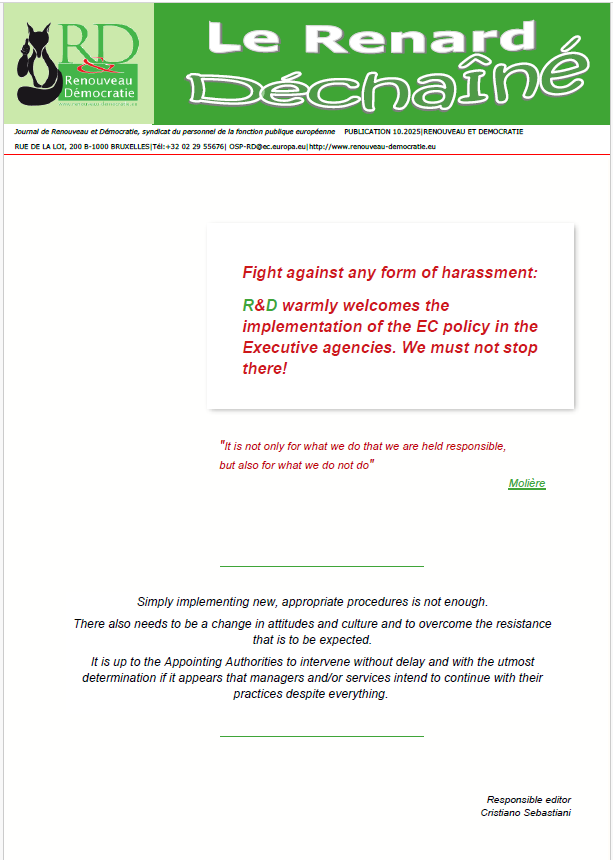
R&D at the forefront of the fight against any form of harassment, warmly welcomes the implementation of the EC policy in the Executive agencies.
We must not stop there!
“It is not only for what we do that we are held responsible, but also for what we do not do” Molière
Simply implementing new, appropriate procedures is not enough.
There also needs to be a change in attitudes and culture and to overcome the resistance that is to be expected.
It is up to the Appointing Authorities to intervene without delay and with the utmost determination if it appears that managers
and/or services intend to continue with their practices despite everything.
For R&D, all colleagues—whether assigned to the Commission, an Agency, or a Joint Undertaking (JU)—deserve the same support and the highest level of protection when it comes to procedures for combating all forms of harassment. .
As of 1 October 2025, Ms Lene Næsager, the Chief Confidential Counsellor (CCC) in the Commission, will take on an expanded role in developing and coordinating the implementation of EC policy to prevent and combat psychological and sexual harassment also in the Executive Agencies, in line with the 2025 Model Decision.
On the one hand, we would like to thank the Directors of the Executive Agencies who agreed from the outset that the decision should fully apply to their staff.
On the other hand, the implementation of the Decision and the extension of the competence of the Commission’s CCC to executive agency staff is a concrete and visible demonstration of the Commission’s new reinforced governance of the agencies and JUs, which we have been calling for a long time and which we are delighted to see gradually being implemented.
In this regard, we would like to express our sincere thanks to Commissioner Serafin, to SG and DG HR and more particularly to Mr Leardini Deputy Secretary-General and Mr Roques Deputy Director-General DG HR, for fully listening to our concerns and requests
Likewise, we greatly appreciated the initiative taken by the Director-General of DG HR to meet with the staff of the Executive Agencies on 6 October.
There are steps in the right direction, but we must not stop there!
It is now up to the parent DGs responsible for the Agencies to follow the good example and stop hiding themselves behind the autonomy of the agencies and the independence of their Directors for not duly fulfilling their governance and supervision duties.
It is now time to conclude the ongoing discussions – which have already lasted too long – in order to apply the Decision and to extend the competence of the CCC to the staff of decentralised agencies as well.
Recap of events read…
Negotiation of the new Commission decision on combating all forms of harassment read…
We are therefore delighted that, as of today, 1 October… read…
We must not stop there!
It is now up to parent DGs responsible for the Agencies to follow the good example. read…
“Ridicule doesn’t kill, but it makes you feel uncomfortable” read…
Conclusion read…
Recap of events
The so-called ‘zero tolerance’ policy
R&D has long condemned European institutions for denying the urgent need to implement effective procedures to prevent—and, if necessary, identify and punish—cases of psychological and sexual harassment and other inappropriate behaviour. For too long, they have been content with empty rhetoric, that of the so-called —and now legendary—‘zero tolerance’ policy.
Faced with the refusal to implement real policies to combat all forms of harassment that go beyond mere slogans and finally to ensure the effective management of complaints received, conduct credible investigations, punish proven cases with zero tolerance, and protect and duly compensate victims… we have also turned to the EP, and in particular the CONT Committee, to ensure that harassment is included as a key point in the discharge of each institution.
This was the case, for example, with the EESC, whose discharge was rejected and then postponed due to its unacceptable inability to handle the cases of harassment that we had reported and which had been confirmed by the results of OLAF investigations. These cases are now before the Belgian courts ( link ).
For R&D, staff deserve the best
Unsatisfied with this unacceptable situation, which denies the suffering of the victims, R&D federal, as the main trade union for European civil servants, has mobilised the best European experts in this field and set up a multidisciplinary team of high-level specialists including national-level experts involved in proceedings related to suicides at France Télécom and La Poste.
It is also with the help of these experts that we have successfully defended victims of harassment, violence in the workplace and toxic management, in the context of OLAF and IDOC investigations, which we have often requested and obtained.
Similarly, in collaboration with leading experts in each field, R&D has organised numerous conferences and webinars ( link ), to prevent psychosocial risks and provide food for thought for the implementation of a genuine occupational risk prevention policy.
R&D’s conferences on Harrasment, Pathogenic management & Prevention of psychosocial risks
- PSR and QLW, what are we talking about? + Presentation FR
- Institutional psychological harassment: when work organisation and pathogenic management push the victim to extremes! + Presentation
- Psychological harassment, meaning and prevention + Presentation
- Pathogenic management, what are we talking about? + Presentation FR+ Pathogenic management techniques
- Pourquoi le travail peut-il nous rendre malade? + Retranscription
- Not being able to do your job properly… + Presentation
- “The effects of hyper connectivity” + Presentation
- “New work organisations” + Présentation
- Burnout, what are we talking about? + Presentation + Burn out propagation test
Negotiation of the new Commission decision on combating all forms of harassment
Dealing with individual cases and working in cooperation with leading experts in the field has enabled us to identify the issues that need to be resolved and to put forward detailed and well-reasoned proposals for reforming the current procedures.
In particular, we emphasised the urgent need to put an end to:
- – the inability to protect victims during and after the investigation, in terms of compensation for the consequences suffered if the allegations prove to be well-founded;
- – unacceptable excessive indulgence towards those responsible, compared to practices in Member States, often based on the sole idea that the managers are always right, placing the burden of proof solely on the victim;
- – tolerance of the ‘omertà’ of managers and witnesses, in violation of the obligations laid down in Articles 21 and 22a of the Staff Regulations;
- – investigations conducted without the necessary guarantees of professionalism and independence, removing obstacles to OLAF’s involvement in these investigations
- – procedural obstacles and lack of information for victims concerning the transfer of cases to national judicial authorities
On this basis, R&D drew up its proposal for reforming procedures to combat all forms of psychological and sexual harassment, which was subsequently successfully negotiated with the Commission in the greatest unity of action in staff representation and in close cooperation with the staff representatives and the Harassment Watch Network, whose collaboration was absolutely essential.
One crucial proposal that has been taken into account in the new decision is the establishment of the role of Chief Confidential Counsellor (CCC).
This is a request that we had made on several occasions in the past, drawing inspiration from best practices, particularly those of the World Bank.
Indeed, the CCC is the most significant element of this Decision in view of its mandate, its independence ensured by its direct reporting line to the Commissioner responsible for Human Resources, its role in coordinating trusted persons and its responsibility as a “single entry point” for victims.
On 12.12.2023, the new decision came into force at the Commission, and we are pleased to see its first positive effects, particularly in relation to the crucial role of the CCC and to the visible strengthening of the role of Confidential Counsellors. This is despite the fact that other actors, particularly those involved in the management of Article 24 cases and the conduct of formal procedures, do not seem to have fully grasped the change in approach and the fact that the new procedures are ultimately focused on the defence of victims .
However, for R&D, it would have been inconceivable to treat agency colleagues as ‘second-class’ staff who did not enjoy the same level of protection as Commission staff.
We are therefore delighted that, as of 1 October 2025, Ms Lene Næsager, the Chief Confidential Counsellor (CCC) in the Commission, will take on an expanded role in developing and coordinating the implementation of EC policy to prevent and combat psychological and sexual harassment also in the Executive Agencies, in line with the 2025 Model Decision ( Chief Confidential Counsellor expands role to Executive Agencies )
First, we would like to thank the Directors of the Executive Agencies who agreed from the outset that the decision should fully apply to their staff.
To enable all colleagues to understand all aspects of the Commission’s decision, please find here the presentation we have prepared ( link ). We remain, of course, at your disposal should you have any questions.
It should be emphasised that for R&D it was never a matter of simply “exporting” to Agencies a decision that has been negotiated and established without taking into account the specific conditions in which these colleagues are required to work and the difficulties they face.
Indeed, it should be noted that when formulating our proposals and throughout the negotiation of the new Decision, we also took into account the suggestions of our colleagues in the agencies and implemented the lessons learned from the cases we defended, and we have always insisted that it be adopted mutatis mutandis by the executive and decentralised agencies and joint undertakings (JUs) .
We have always emphasised that, with regard to procedures for combating all forms of harassment, the staff of executive and decentralised agencies and joint undertakings deserve absolutely the SAME support and high level of protection, the SAME quality and effectiveness of procedures, and the SAME competence and independence of the investigators responsible for investigations in this area.
In particular, we have always stated that R&D cannot allow colleagues in agencies and JUs to be at the mercy of a few “petty bosses” with inflated egos. These individuals often take advantage of the lack of attention—and even interest—from the parent Directorates-General, the precarious nature of staff contracts, and the absence of genuine mobility. Experts agree these conditions create structural risks that facilitate harassment.
The implementation of the Decision and the CCC’s competence for executive agency staff is a concrete and visible demonstration of the Commission’s new reinforced governance of the agencies and JUs, which we have been calling for a long time and which we are delighted to see gradually being implemented.
In this regard, we would like to express our sincere thanks to Commissioner Serafin, to SG and DG HR and more particularly to Mr Leardini Deputy Secretary-General and Mr Roques Deputy Director-General DG HR, for fully listening to our concerns and requests.
Likewise, we greatly appreciated the initiative taken by the Director-General of DG HR to meet with the staff of the Executive Agencies on 6 October.
This is the first time that such a very welcome initiative has been taken, and it represents a change of approach from the past as well as a concrete and visible implementation of the Commission’s enhanced governance.
In this regard, staff and their representatives now also expect effective social dialogue with DG HR on the various issues concerning the staff policy for our colleagues assigned to executive agencies.
We must not stop there!
It is now up to parent DGs responsible for the Agencies to follow the good example
This change of approach and new impetus shown by the political authority, by SG and DG HR must also be visible on the part of the parent DGs, who too often hide themselves behind the autonomy of the agencies and the independence of their Directors not duly fulfilling their governance and supervision duties. Indeed, unfortunately, experience shows that too often the abuses observed within agencies have been too often facilitated by this lack of attention and even interest on the part of the parent DGs.
It is now time to conclude the ongoing discussions in order to apply the Decision and to extend the competence of the CCC to the staff of decentralised agencies as well.
In this respect, it was reassuring to note that the Directors of the Executive Agencies and their administrative managers did not resort to the same painful, pseudo-legal and dilatory strategies that we regretfully observed among the managers of certain decentralised agencies in the context of the procedure under Article 110 of the Staff Regulations concerning the application mutatis mutandis of the new Decision (link to note F4E).
“Ridicule doesn’t kill, but it makes you feel uncomfortable”
To appreciate their determination to try everything to avoid the application of the Decision and the intervention of the CCC, it suffices to note that some heads of decentralised agencies are not limited to engaging in painful exercises of self-satisfaction by claiming that the procedures in place are already flawless and reflect the so-called “zero tolerance” policy .
To our great surprise, some have even dared to pretend that the implementation of the Decision would have led to the disappearance of confidential counsellors, even though even the most cursory reading of the new Decision shows that confidential counsellors are mentioned 69 times in the text (sic!) and that their role and independence are greatly strengthened by the coordination that will now be provided by the CCC.
However, it was reassuring to note that alongside these unacceptable manoeuvres, we greatly appreciated the invitations we received from the managers of other decentralised agencies thanking us for our efforts and asking us to support their request that Commissioner Serafin and DG HR ensure the Decision is fully applied to their staff, in particular the involvement of the Commission’s CCC.
In this regard, it is now important to bring these discussions to a successful and rapid conclusion so that colleagues in decentralised agencies can also, in turn, enjoy the protection offered by the Commission’s decision, including with regard to the intervention of the CCC, which, it should be reiterated, is an absolutely crucial and inseparable element.
We are confident that, under the political impetus of Commissioner Serafin, whose mandate letter expressly includes the successful implementation of the new Decision and whom we would like to thank for positively responding to our request in this regard ( link ), DG HR will be able to successfully conclude the ongoing discussions, which have already gone on for too long.
Conclusion
Simply implementing new, appropriate procedures is not enough.
All experts agree that the establishment of effective procedures to combat all forms of harassment is only the first step, which is certainly necessary but not sufficient.
There also needs to be a change in attitudes and culture and to overcome the resistance that is to be expected.
It is up to the Appointing Authorities to intervene without delay and with the utmost determination if it appears that managers and/or services intend to continue with their practices despite everything.
It is important to remember that harassment cannot exist in an organisation that does not authorise or tolerate it and that does not limit itself to endlessly repeating the same empty slogans.
It is now time to conclude the ongoing discussions – which have already lasted too long – in order to apply the Decision and to extend the competence of the CCC to the staff of decentralised agencies as well.
The implementation of the new procedures that R&D has long been calling for, must represent a genuine, profound and visible change in approach to the management of cases of harassment or other inappropriate behaviour.
The implementation of the new procedures that R&D has long been calling for must represent a genuine, profound and visible change in approach to the management of cases of harassment or other inappropriate behaviour.
There can be no question of setting up a painful Guepard-style charade: “to change everything so that nothing changes”… ( link)
Cristiano Sebastiani,
President

